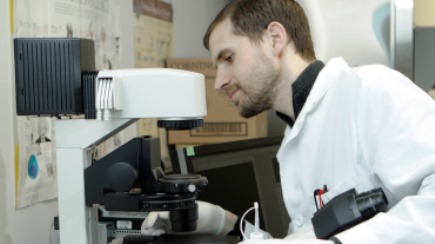
Cancer Biology Graduate Program alumnus Jonathan Irish was one of several students who received the T32 grant in a previous year.
Larry Matherly, Ph.D., director of the Cancer Biology Graduate Program in the Department of Oncology at the Wayne State University School of Medicine and associate center director of Basic Sciences at Karmanos Cancer Institute, has successfully renewed a five-year, $1,328,390 training grant (T32 CA009531) from the National Cancer Institute for the Cancer Biology Graduate Program. The renewal of the training grant until 2022 marks 35 years of continuous support of the program.
"Dr. Matherly received an impact score of 13 on the renewal application, which is almost unheard of in this era of competitive funding," said Oncology Professor and Chair Gerold Bepler, M.D., Ph.D., who also is president and chief executive officer at KCI. "By any measure, this is an impressive accomplishment."
The training grant will support six pre-doctoral Ph.D. and M.D.-Ph.D. students from the Cancer Biology Graduate Program in the Department of Oncology at WSU and Karmanos.
Training resources include the clinical and research facilities and the expertise of 18 basic and clinical faculty members in areas ranging from neoplastic development and invasion and metastasis, to cancer therapy, prevention and cancer epidemiology.
"We have highly dedicated faculty, staff and students involved with our graduate program who contribute to our success. We also benefit immeasurably from the outstanding laboratory and clinical resources of Karmanos," Dr. Matherly said. "This is a remarkable time in cancer research and medicine with extraordinary advances on virtually all fronts ranging from immunotherapy to precision medicine.
"Trainees who receive the Ph.D. from the Cancer Biology Graduate Program are specifically trained in the discipline of cancer biology. This is essential, considering that cancer is the second major cause of human morbidity and mortality in the United States."
The Cancer Biology Graduate Program provides the framework for the T32-supported training program, which provides a unique educational experience that integrates specialized cancer courses, seminars by locally, nationally and internationally recognized speakers, student-faculty research retreats, attendance at national/international meetings, grant writing and specialized workshops and courses, ultimately culminating in a doctorate in Cancer Biology.
"During the last 30 years of support, this training grant has trained an accomplished group of cancer biologists who are contributing substantially to basic and translational cancer research and educational efforts throughout the U.S.," Dr. Matherly said.